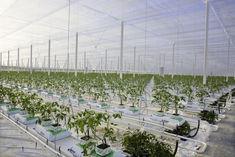
A series of setbacks at the Thanet Earth glasshouse project have severely reduced the overall profits of one of the UK’s biggest supermarket suppliers.
Fresca Group Ltd’s pre-tax profits were cut almost in half after the first full year of the landmark project was beset with difficulties both within and outside the company’s control, figures released to Companies House reveal.
Group sales for the period from 25 April 2009 to 30 April 2010, including joint ventures, were £364 million, an increase of 3.4 per cent on the previous year.
Operating profit increased by 10.2 per cent to £9.7m, but pre-tax profit fell to £4.9m, a drop of 45 per cent, with losses incurred during the first full year of the Thanet Earth project offsetting increases in the profitability of the rest of the group.
In its report, the company blamed the late completion of the packhouse, high start-up costs, a weak sterling driving up the cost of inputs, an extremely weak summer salad market and “a very steep learning curve for the team managing a very sizeable new business”.
However, it stressed that the quality of produce and customer service levels had both been “excellent”.
Disregarding the results of the Thanet Earth project, the group recorded pre-tax profit growth of 14 per cent and Fresca chairman Christopher Mack told FPJ the company expects Thanet Earth to break even in the course of the coming year.
“It has been a very high profile project and it has to be successful,” he said. “It has been a very difficult year but it is a big business and starting up is not easy. The start of the financial year has been good and prospects are positive.”
The Fresca Group has had a busy year with investment at its Southampton and Bristol sites, acquiring foodservice business PJ Down at the latter as well as last week announcing the purchase of Liverpool Produce Terminal, which provides an important direct link from Spain to supply chains in the north of England.
Mack praised the performances of Jack Buck Growers and Valefresh - “businesses where the management have got stuck in and turned the business around” - as well as reliable results from its established subsidiaries Mack Multiples, Mack Wholesale, MM Global Citrus and Manor Fresh.
The group now supplies to every major multiple retailer and Mack said the nature of the fresh produce trade has changed significantly. “All the supermarkets have very different characters and supply chains,” he added. “We have seen these chains evolving and taking out cost. We as a business have to demonstrate that we add value to that supply chain.
“The year ahead depends on many factors - the exchange rates, oil prices, input costs etc. It used to be a little more flexible but supply chains are very tight now.”
He added: “We shape ourselves around opportunity, without allowing complacency or stagnation."